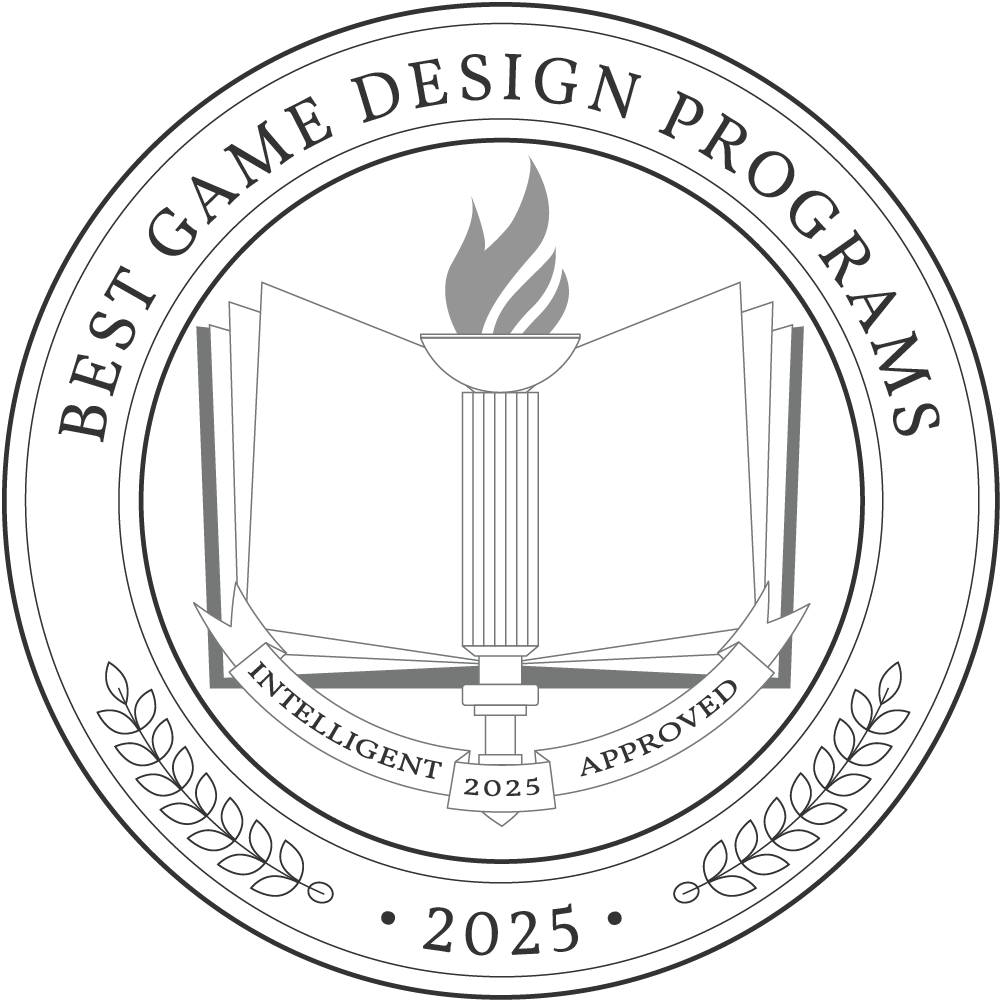Blending technology and artistry, careers in the video game industry are dynamic, creative, and rewarding. Driven by technological innovations, increasing player demand, and an expanding gaming platform market, the gaming industry offers consistent growth and opportunities for professionals across many roles.
Game design requires specialized skills that often overlap with development. With skills and knowledge gained from a game design degree program, graduates can pursue design, engineering, special effects, testing, and numerous other careers. Digital designers and software developers earn median annual wages of $98,540 and $132,270, demonstrating the lucrative options in the industry.
Undergraduate students can complete a game design degree in four years, averaging $14,688 in tuition yearly. Graduate game design programs typically span about two years and average $20,513 per year.
Why Trust Us
The Intelligent.com Higher Education Team is dedicated to providing students with independent, equitable school and program rankings and well-researched resources. Our expert-driven articles cover topics related to online colleges and programs, paying for school, and career outlooks. We use data from the U.S. Department of Education’s College Scorecard, the National Center for Education Statistics, and other reputable educational and professional organizations. Our academic advisory team reviews content and verifies accuracy throughout the year for the most current information. Partnerships do not influence rankings or editorial decisions.
- Analyzed over 2,000 national, accredited, and nonprofit colleges and universities
- 800+ rankings pages are reviewed and updated yearly
- Content is informed by reputable sources, surveys, and interviews with academic advisors and other experts
- Over 100 data points are reviewed for accuracy and quality throughout the year, including sources
How we rank schools
Our list features the best Game Design degree programs at top colleges nationwide. Each school featured is a nonprofit, accredited institution — either public or private — with a high standard of academic quality for post-secondary institutions.
We evaluated each school’s program on tuition costs, admission, retention and graduation rates, faculty, reputation, and the student resources provided for online students. We collected data from trusted sources like the National Center for Education Statistics, individual school and program websites, school admissions counselors, and other data sources. Then, we calculated the Intelligent Score on a scale of 0 to 100 based on the following criterion:
Academic Quality:
- Admission rate versus enrollment rate
- Retention rate of students who return after year one
- Accreditation status (regional and programmatic)
- Nonprofit status, both private and public institutions
Graduation Rate
- Overall graduation rate
- Total number of currently enrolled students, including diversity metrics
- Student-to-faculty ratio
Cost and ROI
- In-state and out-of-state per-credit tuition rates and fees
- Required credits to graduate
- Earning potential after graduation
- Availability of federal student loans, scholarships, and other financial aid options
Student Resources
- Available student services for online-only and hybrid programs
- On-campus amenities like tutoring centers and the number of libraries
Read more about our ranking methodology.
Best 20 Accredited Game Design Degree Programs
FiltersInstitution Type
Status
- Intelligent Score
- Alphabetically By University Name
- Acceptance Rate
- Enrollment
- In-state Graduate Tuition
- Out-of-state Graduate Tuition
- In-state Undergraduate Tuition
- Out-of-state Undergraduate Tuition

University of California, Santa Cruz
Intelligent Score: 97.73In-state: $11,442
Out-of-state: $41,196
In-state: $11,442
Out-of-state: $11,442
SAT: 1310-1530
ACT: 30-35
$347
On-Campus
Accrediting Commission for Senior Colleges and Universities of the Western Association of Schools and Colleges
180

Rochester Institute of Technology
Intelligent Score: 97.43In-state: $47,352
Out-of-state: $47,352
In-state: $50,136
Out-of-state: $50,136
SAT: 1220-1420
ACT: 28-33
$2,017
On-Campus
Middle States Commission on Higher Education
121

Indiana University Bloomington
Intelligent Score: 95.8In-state: $9,815
Out-of-state: $36,194
In-state: $9,786
Out-of-state: $9,786
SAT: 1120-1350
ACT: 24-31
Resident: $332
Non-Resident: $1,261
On-Campus
Higher Learning Commission
120

University of California, Irvine
Intelligent Score: 95.67In-state: $11,442
Out-of-state: $41,196
In-state: $11,442
Out-of-state: $11,442
SAT: 1310-1530
ACT: 30-35
$348
On-Campus
Western Association of Schools and Colleges, the Senior College and University Commission
176

New York University
Intelligent Score: 94.77In-state: $52,204
Out-of-state: $52,204
In-state: $34,704
Out-of-state: $34,704
SAT: 1370-1540
ACT: 31-34
$1,855
On-Campus
Middle States Commission on Higher Education
128

Northeastern University
Intelligent Score: 94.55In-state: $54,360
Out-of-state: $54,360
In-state: $25,264
Out-of-state: $25,264
SAT: 1410-1540
ACT: 33-35
$1,938
On-Campus
New England Commission of Higher Education
128

University of Wisconsin at Stout
Intelligent Score: 93.14In-state: $9,273
Out-of-state: $37,161
In-state: $10,728
Out-of-state: $10,728
SAT: 1260-1460
ACT: 27-32
Resident: $244
Non-Resident: $529
On-Campus
Higher Learning Commission
120

Bradley University
Intelligent Score: 92.81In-state: $35,060
Out-of-state: $35,060
In-state: $16,740
Out-of-state: $16,740
SAT: 1080-1280
ACT: 22-28
$1,090
On-Campus
Higher Learning Commission
124-125

George Mason University
Intelligent Score: 91.11In-state: $9,510
Out-of-state: $32,970
In-state: $12,594
Out-of-state: $12,594
SAT: 1100-1300
ACT: 24-30
In-State: $420
Out-of-State: $1,427
On-Campus
Southern Association of Colleges and Schools Commission on Colleges
120

University of Central Florida
Intelligent Score: 90.94In-state: $4,478
Out-of-state: $19,810
In-state: $6,916
Out-of-state: $6,916
SAT: 1160-1340
ACT: 25-30
In-State: $212
Out-of-State: $748
On-Campus
Southern Association of Colleges and Schools Commission on Colleges
120

Drexel University
Intelligent Score: 87.48In-state: $53,868
Out-of-state: $53,868
In-state: $36,234
Out-of-state: $36,234
SAT: 1180-1380
ACT: 25-31
$1,311
On-Campus
Middle States Commission on Higher Education
191

Columbia College Chicago
Intelligent Score: 87.01In-state: $53,716
Out-of-state: $53,716
In-state: $29,479
Out-of-state: $29,479
SAT: Not Required
ACT: Not Required
$1,115
On-Campus
Higher Learning Commission
120

Quinnipiac University
Intelligent Score: 86.63In-state: $48,200
Out-of-state: $48,200
In-state: $19,350
Out-of-state: $19,350
SAT: N/A
ACT: N/A
$1,210
On-Campus
New England Commission of Higher Education
114-120

Fitchburg State University
Intelligent Score: 85.92In-state: $970
Out-of-state: $7,050
In-state: $3,420
Out-of-state: $3,420
SAT: N/A
ACT: N/A
In-State: $40
Out-of-State: $293
On-Campus
New England Commission of Higher Education
120

Lawrence Technological University
Intelligent Score: 82.70In-state: $35,430
Out-of-state: $35,430
In-state: $17,318
Out-of-state: $17,318
SAT: N/A
ACT: N/A
$1,350
On-Campus
Higher Learning Commission
120

DePaul University
Intelligent Score: 82.05In-state: $40,551
Out-of-state: $40,551
In-state: $19,370
Out-of-state: $19,370
SAT: N/A
ACT: N/A
$758
On-Campus, Online
Higher Learning Commission
192

Champlain College
Intelligent Score: 81.50In-state: $64,010
Out-of-state: $68,575
In-state: $19,635
Out-of-state: $19,635
SAT: 1224
ACT: 28
$2,000
On-Campus
New England Commission of Higher Education
120

Kennesaw State University
Intelligent Score: 80.70In-state: $4,450
Out-of-state: $15,704
In-state: $5,328
Out-of-state: $5,328
SAT: 1030-1200
ACT: 19-25
Resident: $185
Non-Resident: $654
On-Campus, Online, Hybrid
Southern Association of Colleges and Schools Commission on Colleges
120
How to Choose a Game Design Program
Choose your area of study
Game design degree programs prepare students for a variety of video game careers, many of which require specialized skills and knowledge. It’s important that a program or area of study aligns with student goals and provides the necessary training for careers in game design.
Arts and fine arts programs typically best suit students who want to pursue the creative side of game design. A Bachelor of Fine Arts in game design program provides students with interactive media training that hones their skills in storytelling, visual design, animation, and other digital art aspects. Similarly, a Master of Fine Arts in game design program emphasizes artistic and creative elements but at a more advanced level. Students in these tracks often progress to careers as concept artists, game designers, and special effects artists.
Science-focused game design programs like computer science emphasize the technical skills required for game design and development. Undergraduate computer science programs typically offer game design as a minor rather than a major, and coursework integrates creative game design with advanced knowledge in computer programming, artificial intelligence technology, and mathematics. Graduate programs may offer game design and development as a concentration emphasizing development skills. This path leads to careers in game engineering and development.
Research schools and programs
As you begin your research, prioritize accredited schools and programs. Regional accreditation verifies academic quality per the Department of Education’s standards and is generally required to access federal financial aid. Most institutions only accept transfer credits from regionally accredited schools, and many employers prefer applicants with accredited education.
Search for verification status on the Council for Higher Education Accreditation (CHEA) and the Database of Accredited Postsecondary Institutions and Programs (DAPIP). Prospective students can search school and program websites for more information about accredited curriculums. Admissions counselors may also provide additional guidance and direct you to in-person or virtual information sessions, campus tours, and other resources.
Prepare for tests and applications
Although admissions standards may vary, most institutions require a combination of the following for undergraduate or graduate students:
- Application form and fees
- Transcripts
- Letter(s) of recommendation
- Personal essay or statement
- Resume or CV
- SAT or ACT scores for undergraduates
- GRE or GMAT scores for graduates
- TOEFL (for students educated in a non-English language)
Some schools or programs may require undergraduate students to complete a year of general studies or specific prerequisite courses before they can declare a major and access major-specific game design courses. Additional graduate program requirements may include a related undergraduate degree from an accredited institution, a game design portfolio, or professional experience.
Select your program
Consider your needs and goals as you select a program and its options and opportunities. School location, course delivery options, faculty, curriculum details, and other factors may affect student decisions.
For example, many students have careers or other obligations to balance with their education and may prefer online, self-paced, or other flexible course options. In contrast, students who benefit most from immersive and hands-on education may prefer course delivery and curriculum that includes instructor and peer interaction, internships, or work co-ops.
Determine how you’ll pay for your degree
Regardless of financial circumstances, students should submit the Free Application for Federal Student Aid (FAFSA). This program assesses student funding needs and awards loans, grants, scholarships, and other assistance. Financial aid officers and admissions counselors can provide information about tuition, financial assistance options, and other details to help inform student funding needs.
Students can also research needs or merit-based funding opportunities from businesses, non-profit foundations, and other organizations. Some employers offer tuition assistance benefits for eligible students to improve the skills of their workforce. Depending on their program and curriculum, students may supplement their funding needs with income from work studies, co-op positions, assistantships, and fellowships.
What Can You Expect From a Game Design Program?
An undergraduate game design degree program equips students with the creative and technical skills needed for various roles across the video game industry. These programs blend computer programming, sound and audio, writing, visual art, and other disciplines to enable students to design and produce games.
Most undergraduate degree programs require about 120 credits of core and elective coursework, which typically takes about four years. Some program curriculums may also include mandatory internships, capstone research, or game design projects.
In graduate degree programs, students study game design and development at an advanced level. Students engage in theory and hands-on application coursework and may participate in work experience opportunities. Most curriculums culminate in a final game design project or thesis to demonstrate their fulfillment of program outcomes. Graduate programs require between 30 and 60 credits, typically spanning about two years.
Students with a passion for design should also check out graphic design programs, as this may be a better fit for your personal interests and career goals.
Potential courses you’ll take in a game design program
- Video Game Programming. This course presents computer programming concepts and methods through the lens of video game development. Topics may include application programming interface structure, input schemes, and content pipelines that build a functional graphics engine.
- Computer Graphics Foundations. In this study of software and hardware for interactive graphics, students gain an understanding of basic computer graphics concepts, 2D and 3D modeling, rendering techniques, kinetics, motion capture, and graphics systems. This course often blends programming fundamentals, algorithms, and other topics into coursework.
- Digital Audio Production. This course explores the techniques and technologies to produce digital audio. Coursework typically covers digital audio recording and production, synthesis techniques, and digital audio applications for multimedia game production.
- Game Concept Development. Students conceptualize, design, and develop games, often completing a game demo as a final project. This course prepares students for the game design and development lifecycle by incorporating level design, user experience and interface, game mechanics, and other details.
Game Design Degree Frequently Asked Questions
How do I apply to a game design degree program?
Institutions typically feature a web-based applications portal that guides students to submit forms, materials, fees, and other application requirements. Admissions counselors can verify application deadlines, requirements, and fees and can also provide additional insights that can help strengthen your application.
How much does a game design degree cost?
Tuition and fees for an undergraduate program average $14,688 per year, and graduate programs average $20,513 annually. On-campus room and board can increase undergraduate fees to $27,673 but may provide savings on housing, food, and other off-campus living costs.
Course delivery method and cost of materials can also affect your total expenses. Scholarships, grants, loans, and other funding resources can reduce the amount students pay upfront.
How long does it take to earn a game design degree?
Undergraduate programs usually require about 120 credits and four years of full-time study. Graduate programs require between 30 and 60 credits and typically take two years. Part-time, self-paced, or accelerated programs can affect the total duration of the degree.

